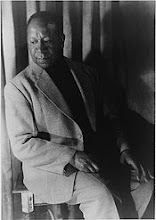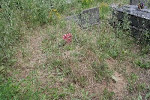Last week, I introduced "Beauford Delaney (Instrumental)," a track on Volume 3 of the newly released three-volume recording entitled Free Lunch,. Intrigued by the music, I interviewed recording artist Free (Lee) Tillman about it. Read Part 1 of "Beauford Delaney and Free Lunch" HERE.
Part of our interview explored Tillman's associations between "Beauford Delaney (Instrumental)" and specific pieces of Beauford's art.
I asked him what he would say if he had to describe the instrumental Beauford Delaney as a color, and he responded "It would be a cloudy gray."
He then shared links to images of some of the darker pieces of Beauford's work that come to his mind when he thinks about the song. The works are pictured below.
Watercolor
Signed at bottom right, dated, and annotated "Souvenir" at bottom left
© Estate of Beauford Delaney,
by permission of Derek L. Spratley, Esquire,
Court Appointed Administrator Untitled, circa 1960
Oil on paper mounted on canvas
Image courtesy of www.ha.com
© Estate of Beauford Delaney
by permission of Derek L. Spratley, Esquire,
Court Appointed Administrator
Untitled (Ibiza)
© Estate of Beauford Delaney
by permission of Derek L. Spratley, Esquire,
Court Appointed Administrator
The majority of music Tillman makes is instrumental, yet he was inspired to insert a mysterious voice into "Beauford Delaney (Instrumental). Listening carefully, you will hear a woman saying "Sometimes I wish we could vanish." When I asked Tillman about this, he told me that he also created a vocal version of "Beauford Delaney" for his album. He shared that recording with me and commented about it as follows:
"This song happens to be one of only two songs on the album that has alternative versions where I provided vocals. The song “Theaster Gates” has a spoken word passage and the song Beauford Delaney has me rapping on it. I provided the instrumental versions in case people didn’t want to hear my voice."
Regarding a possible relationship between the single line of spoken words in the instrumental version and the lyrics of the vocal version, he said:
"There is no direct relationship. When I originally made the song, it felt like it needed a human voice, so I added the vocal sample. It's not meant to be completely intelligible. It's meant to sound like something you might hear in a dream. I then decided to create something more direct, so I added my own vocals. One thing let me to the next, but I wouldn't say that they're directly related as far as what's being said."
Listening to the vocal version of "Beauford Delaney" and comparing it to the instrumental version, the two Beauford Delaney works shown below came to my mind. I sent images of them to Tillman and asked him to share his reactions to them.
(1967) Oil on canvas
© Estate of Beauford Delaney
by permission of Derek L. Spratley, Esquire,
Court Appointed Administrator
(1967) Oil on canvas
Private collection
© Estate of Beauford Delaney
by permission of Derek L. Spratley, Esquire,
Court Appointed Administrator
His response:
"The blue painting feels like the instrumental. The portrait feels like the vocal version."
To wrap up our interview, I asked Tillman the following questions:
Les Amis: Relating to the theme of your album, Free Lunch, if you could have lunch with Beauford today, what would you want to discuss with him?
Free Tillman: I would love to talk with him about the Harlem Renaissance and what it was like living in Greenwich Village.
Les Amis: What might you ask his advice about?
Free Tillman: How to convey one's political and social beliefs through abstract art.









No comments:
Post a Comment